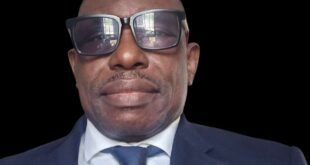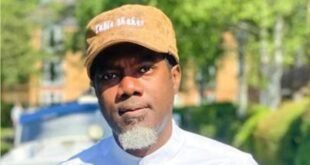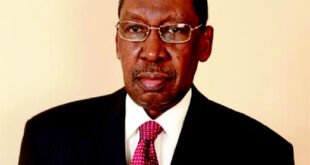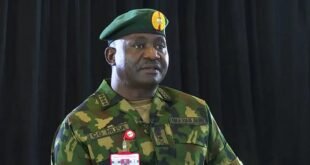On the day of democracy, the leaders of the Missions of the United States, the United Kingdom, Finland, Norway and Canada would like to recognize and congratulate the commitment of the Nigerian people for 26 years of democratic governance.
Healthy democracies are made up of many important ingredients and when they mark 25 years of democracy in Nigeria in 2024, President Tinubu stressed that in Nigeria “there must be different perspectives and points of view”.
The free expression has long been a fundamental value of Nigerian democracy. The establishment of Nigeria sancite the right to freedom of expression, with the aim of protecting the rights of its citizens and promoting a society in which people can discuss and discuss free ideas from government control. This right, a principle of trust in ordinary citizens to discuss the virtual public square, today remains vital.
In April, the National Human Rights Commission (NHRC) of Nigeria raised concerns about the Cybercrimes Act 2015, the amendments made in 2024 and the impact of the law on free expression.
The act has praisable objectives: fighting online fraud and computer attacks. There is growing evidence, however, that the act is used by some to silence criticism and dissent.
The consultative opinion of the NHRC on freedom of expression warned that “has potential for abuse, in particular as regards the arrests and judicial proceedings of activists, journalists, bloggers and users of ordinary social media”. In addition, in 2022 the Court of Justice Ecowas established that the law does not comply with the obligations of the country relating to the freedom of expression pursuant to the African Charter on human rights and populations and the international alliance on civil and political rights.
The improper use of the Cybercrimes Act threatens democratic progress and civic participation. In addition, it jeopardizes the trust of investors and risks by discouraging the innovation necessary for economic growth.
Consider the case of deleg Farotimi, accused of 12 counts of computer crime after reporting of alleged corruption in the judiciary in a book and on a podcast. Farotimi was presumably held in Lagos, transported through state lines to Ekiti and brought to court in handcuffs. Although the accusations have finally been withdrawn, his ordeal highlights a worrying issue: the Cybercrimes Act, originally intended to fight online fraud and cybertterorism, can be used improperly as a tool to suffocate free expression and undermine democratic commitment. Farotimi is not alone. Journalists, activists and ordinary citizens have undergone similar accusations for the sharing of opinions or reports on the alleged corruption. This distortion of the original entity of the law can lead citizens to become hesitant to speak, weaken democratic responsibility and potentially feeding distrust in the government.
The Nigeria Communications Commission (NCC) estimates that the country loses $ 500 million per year for the IT crime. This problem requires an answer. However, the wide language of the Cybercrimes Act, in particular its vague definitions of “false information”, “cyberstalking”, “harassment” and “insults” leave room for confusion and potential abuse. The large area of the law allows him to be used improperly against Nigerian citizens who try to express dissent, form opinions or criticize powerful people. Nhrc invited the police to “pay attention” to how they interpret the section 24 frequently used by the deed to make sure that the accusations reflect a real threat to public order.
Therefore, we welcome the commitment of the Minister of Information and National Orientation of Nigeria, Mohammed Idris, to collaborate with the National Assembly and the interested parties relevant to review the Cybert crimes law.
The implications extend beyond the free expression. Nigeria’s economic future depends on its ability to innovate and attract investments in the digital age.
However, the incorrect application of the Cybercrimes Act, even in a small number of cases, the risks diminish the innovators and entrepreneurs that the government wants to invest in Nigeria. The Cybercrimes Act also contributes to uncertainty abroad on the legal scene of Nigeria.
Its vague provisions make it difficult for companies and investors to evaluate legal risks, hindering investments in sectors that are based on digital content. A reform is needed to protect both citizens’ rights and the future of Nigeria.
The mission garments signed in Nigeria encourage Nigerian legislators to consider the reform of the law on cybercrimes crimes to restrict the definitions of key terms such as “false information”, cyberstalking, “insult”, “hatred” and “harassment” and ensure that these definitions cannot be mistakenly used for the criticism of the silence and the expression of Censor.
As friends of Nigeria who share the country’s strong commitment towards democratic values, we want Nigeria to make its potential as a democratic digital power.
We therefore welcomed the Nigerian government that modifies the law to find a balance between protecting citizens while preserving human rights, including free expression. This will be a difficult balance to hit, but it is vital to provide what Nigeria wants: a stable and open democracy and an economic growth supported by investments.
Nigeria is not alone to face this problem. Democracies around the world are struggling with challenges and opportunities in constant evolution that the digital world presents.
Through the global project of the Council of Europe on the computer crime project, Nigerian legislators are receiving funding and technical assistance to help the current revision of the law to lead to the legislation that satisfies international standards and the best practices.
However, the deadline for revision of the law has been constantly delayed and we urge Nigerian legislators to make this revision a priority and ensure that it is open to consultation and public debate.
Free expression is a precious goods that is based on all of us to respect it. It is a fundamental tenant of the Nigerian Constitution. Nigerians and all citizens of countries around the world should be able to retain and express their opinions, even if these opinions are unpopular.
Signed,
Mission garments
Richard M. Mills, Jr., Embassy of the United States
Richard Montgomery, British High Commission
Sanna Selin, Embassy of Finland
Svein Bine, Embassy of Norway
Pasquale Salvaggio, High Commission Canadian
Post views:
118
 JamzNG Latest News, Gist, Entertainment in Nigeria
JamzNG Latest News, Gist, Entertainment in Nigeria









